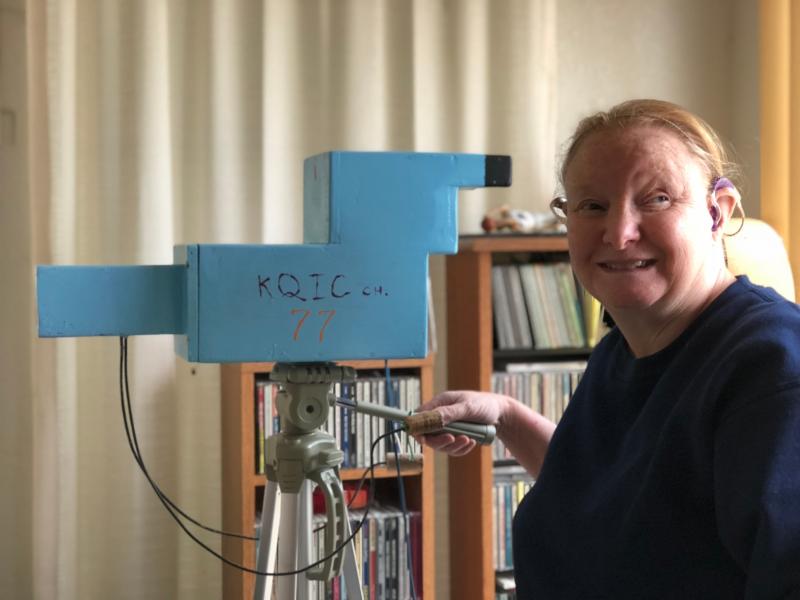Shirley Quick lives in a single-wide mobile home in a trailer park in an industrial area in Sacramento. Her family bought the trailer for her and though it is small, Shirley has made it a home. Decorated with flamingos, a life-sized model of a TV camera her brother-in-law built for her, and a collection of hand drawn and cutout call letters from local radio and TV stations, when you enter the trailer you instantly sense Shirley’s joy for life. But staying in her trailer has been a year’s long struggle for Shirley, and one that she will likely lose.
Rent at the trailer park has steadily increased. Shirley, who lives off of social security – a subsidy of $900 per month – now pays $693 dollars in rent with an additional $60 for utilities. That leaves her $147 per month to pay for all of her other expenses. $147 to pay for food, cleaning supplies, any out of pocket medical expenses that might come up. Shirley, like many people with disabilities, lives her life on a financial tightrope.
For the past two years Shirley has been seeking assistance from Housing and Urban Development (HUD). She has been applying and reapplying for a voucher that will cover $500 of her rent each month. A small sum that for Shirley, and others in her position, will make a tremendous impact.
One setback after another has kept Shirley from receiving the assistance she needs from HUD. Her trailer was owned by her sister and though none of her rent is payed to her sister, her first application was reject because of a rule which disqualifies people who live in a family owned property from receiving a voucher. Compared with the larger battle that Shirley has faced convincing her landlord to even consider taking a HUD voucher, this was a relatively easy predicament to fix. Shirley’s sister sold the trailer to a trusted family friend.
Landlords have no legal obligation to accept HUD vouchers from their tenants. Many refuse to rent to applicants with vouchers at all. People who were able to afford their rent without vouchers are not protected from losing their homes if – as in Shirley’s case – rent increases put them in the position where they need vouchers to continue paying rent.
Shirley has been trying to get a voucher for over two years. Her landlord was reluctant to accept a voucher from the first conversation that they had, telling Shirley and her direct support professional that she was opposed to the idea of her tax dollars being used to support other people who should be self-sufficient. Despite this attitude, after years of negotiating, the landlord finally agreed to take the voucher if and when Shirley was approved.
The process of applying for the voucher involves multiple, hours long visits to the HUD office, and a level of documentation and organization that would challenge even the most Type A among us. For Shirley, and other people with disabilities, this process asks things that are often even more difficult because of the disabilities which are at the root of why they need the vouchers in the first place. Despite the layers of complexity, Shirley persisted and was finally approved for a voucher six months ago. At the last minute her landlord had a change of heart and refused to accept it.
This put Shirley back at square one. She applied for an extension of the HUD voucher as she began the process of looking for an inexpensive apartment that will take the voucher.
In Sacramento, as in most of the state, most apartments require renters to prove that their monthly income is at least three times higher than their rent. With $900 from Social Security and $500 from HUD each month, Shirley’s rent would have to be $466.66 to meet that condition.
As of May 2017, according to a study conducted by the California Housing Partnership, the median asking rent in Sacramento county is $1,350. While there are some low-income housing units in Sacramento, cuts in federal and state funding have drastically reduced the availability of affordable housing. Since 2008 there has been a 66% decrease in the production and preservation of exactly the type of housing that Shirley, and others like her, need. These cuts mean that Sacramento county is 62,072 affordable rental homes short of meeting the needs of its residents.
Despite the odds she faces, Shirley is determined to stay in Sacramento. At her day program she takes a film class where she is learning to operate TV cameras. This has been a life-long dream. Shirley loves TV and radio so much that she calls out in delight when she sees local news vans driving around town, greeting them as friends. Shirley knows all of the stations in Sacramento. Sacramento is where her friends meetup and go bowling each Wednesday evening. Sacramento is home to Shirley, and Sacramento is lucky to have her.

Christian McMahon, Communications Specialist, the Arc of California

